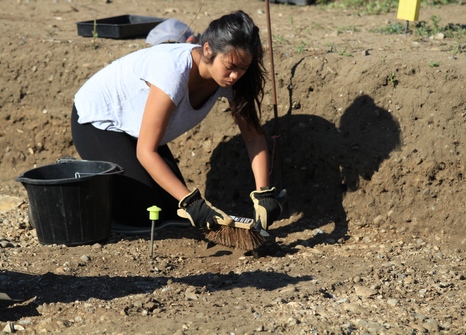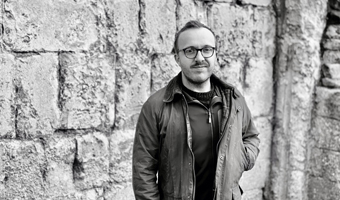Fieldwork
All our archaeology undergraduates take part in fieldwork and practical teaching sessions as part of their degree.
These practical sessions give you the opportunity to:
- gain hands-on experience in surveying and excavation
- see finds in context and learn how to study real archaeological evidence
- gain skills in laboratory work and data analysis
- work individually and as part of a team in real-world professional contexts
There are also additional opportunities to increase your experience and skills through work experience and volunteering.

The world is your oyster if you come to Nottingham, because the training is so good and it's such a respected university that they're happy to take students on outside digs.
- Hillery Harrison, BA Archaeology
Excavations and fieldwork
What are the benefits?
Fieldwork is where much of our primary information about the past comes from, and it's important to learn about its advantages and limitations.
Working on site is the best way to learn new archaeological skills, as well as offering a valuable team-building experience.
- All archaeology students take part in a dedicated fieldwork placement as part of their degree
- The fieldwork must be at an approved site – either run by department staff or another organisation
- A list of approved projects is provided in March each year, but students have the opportunity to work on almost any professional project (subject to approval)
- The department has a fieldwork officer who can assist students in finding an appropriate project
In recent years, students have taken part in excavations at Nottingham Castle and on numerous projects around the UK, as well as projects in Crete and Italy.

It was great getting hands-on experience. These excavations allowed me to see the full process of archaeological investigation in practice; from the first spade in the ground through to site recording and finds processing.
- David Hanks, 2015 Archaeology graduate, now working as Collections Manager for English Heritage
Read David's full profile
Fieldwork
Fieldwork is a compulsory element in both single and joint honours archaeology degrees.
Students are asked to keep a journal of their fieldwork experience and in year two they are assessed through the production of a report on their fieldwork experience and skills development. All fieldwork trips will be staff approved.
Requirements
- Single honours – 20 days (which can include up to 10 days of museum training or similar professional experience)
- Joint honours – 10 days (which can include up to five days in a museum or similar environment)
Scheduling
Fieldwork is usually carried out during the summer vacation, but it can be completed at other times of the year. Students are required to complete at least part of their fieldwork requirement in the first year of their degree.
Funding for compulsory fieldwork
Many of our excavations are free but may require travel expenses. For example, for overseas excavations you may need to pay for your own flights, while others will require a training fee. You can claim back a proportion of your costs from the department. Students are entitled to claim back £30 of expenses per day of work within their fieldwork; this figure may be subject to change.
Please be aware that study abroad, compulsory year abroad, optional placements/internships and integrated year in industry opportunities may change at any time for a number of reasons, including curriculum developments, changes to arrangements with partner universities or placement/industry hosts, travel restrictions or other circumstances outside of the university's control. Every effort will be made to update this information as quickly as possible should a change occur.
Further experience
If students wish to build up a body of professional experience in excavation, laboratory skills, or working in a museum or heritage organisation, we strongly encourage you to gain additional professional experience through our work experience and volunteering opportunities.
We have excellent relationships with key local archaeological and heritage organisations, including:
- Trent and Peak Archaeology
- Nottingham City Museums Service
- Nottinghamshire County Council
- National Trust
- Historic England
Many of our students have obtained work experience placements with these organisations and have gone on to successful further training and a career in the archaeology and heritage sector. Further experience is self funded and indeed in some cases students are paid by the organisation.
Case study: Revolutionising our understanding of Southwell
Nottingham students played an active part in 'Digging the Peculiar': the Southwell Archaeology Project.